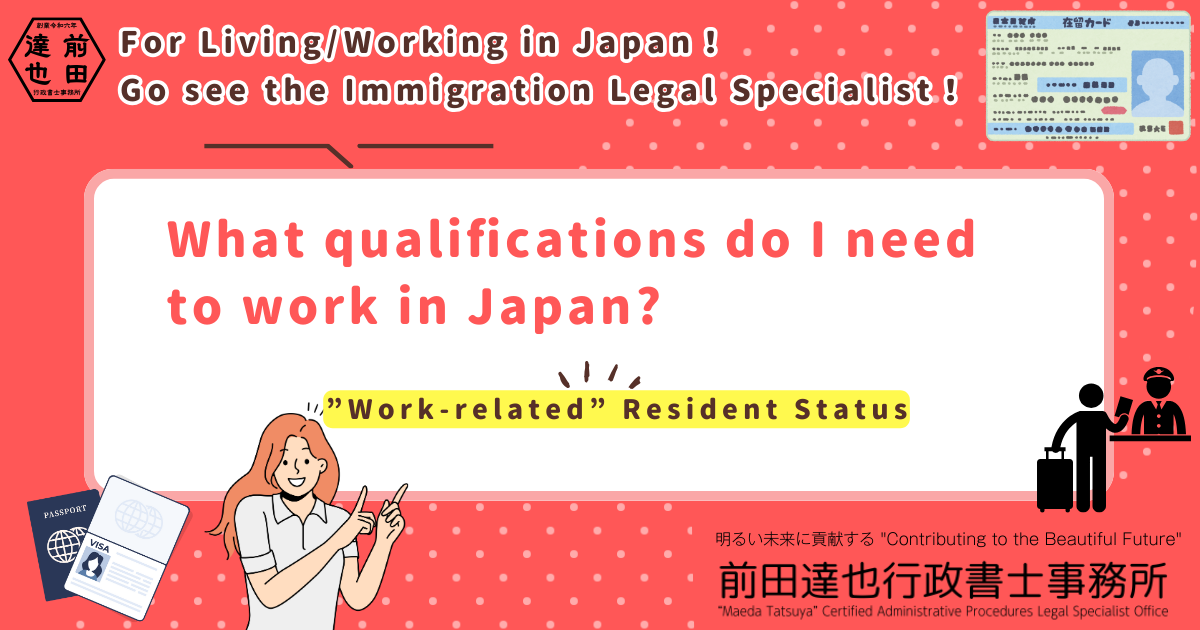In another article, “Which procedures are required to reside in Japan?”, I explained that there are two types of status of residence: “work-related” and “status-related”.
In this article, I will explain the outline of “work-related” residence status. If you need to know the detail and accurate information, please visit and see “Immigration Service Agency” website.
“Diplomacy” will be allowed for members of foreign government missions and consular agencies and their families.
“Official” is permitted for persons engaged in official duties for foreign governments or international organizations approved by the Japanese government and their family members.
“Professor” is for a person who conducts research, provides research guidance, or teaches at a Japanese university or other institution, and is authorized to be a professor at a university or other institution.
“Art” is permitted for those who engage in artistic activities such as music, art, literature, etc., that generate income.
“Religion” will be allowed for religious leaders, missionaries, etc. sent to Japan by a foreign religious organization.
“Press” is permitted for reporters and cameramen who engage in press activities under contract with foreign news organizations.
The following residence statuses are subject to “the landing permission criteria”. Simply say, there are more types of activities permitted, but the conditions for permission are somewhat more complex.
“Highly specialized” is for persons with a high degree of professional competence. Applicable activities are defined by a Ministry of Justice ordinance.
“Business owner / Manager“ will be permitted for persons who operating the business or
manage the companies, etc.
“Legal / Accounting services” is allowed for those who use their official qualifications, such as lawyers and certified public accountants.
“Medical” is for persons such as physicians, dentists, nurses, etc.
“Research” will be allowed for researchers from government agencies and private companies who are engaged in research.
“Education” is permitted for language teachers, etc. at junior high schools, high schools, etc.
“Technical/Humanities/International Services”, This category is enhanced for those who engage in activities such as engineers, interpreters, designers, language teachers, marketing, etc. Many foreign students who found their employment in Japanese companies are staying in Japan with this status.
“Intra-company transfers”: Permitted for transfers from a foreign establishment to an establishment in Japan for a certain period.
“Care worker” is permitted for qualified individuals, such as caregivers, to provide nursing care or instructer for nursing care.
“Show business“: actors, singers, dancers, professional sports selectors are allowed to.
“Technician”: foreign cuisine cooks, sports coaches, aircraft pilots, precious metal fabricators are permitted.
“Specified Technical Skill Class1: Permitted for those who perform skilled work that requires considerable knowledge and experience in a specific industrial field.
“Specified Technical Skills Class2: Permitted for more mature skilled technicians in specific industrial fields.
“Technical internship“: This is granted to ‘technical intern trainees’ for the purpose of creating human resources in developing countries. However, “Technical Intern Training System” will be abolished and “Training and Employment System” will be implemented by 2027.
The follows are “non-working” qualifications.
“Cultural Activities”: Permitted for academic or artistic activities that do not involve income, for those who wish to learn Japanese culture under the guidance of an expert, and for researchers of Japanese culture.
“Temporary stay”: for short-term stays for tourism, recreation, sports, visits to relatives, tours, courses, meetings, etc.
These are “non-working” status, but subject to “the landing permit criteria”, i.e., more types of permitted activities but with slightly more complicated permit conditions.
“Study Abroad”: Permitted for students and pupils of universities, junior colleges, technical colleges, high schools, junior high schools, elementary schools, etc.
“Trainee“: Except for Technical Internship Class1 and Study Abroad, trainees accepted by public or private institutions in Japan are permitted to receive this status.
“Family Residency”: This is granted to spouses and children who are dependent on the foreign resident.
The Minister of Justice may permit activities specifically designated for individual foreign nationals.
“Specified Activities”: permitted for activities specified here, such as diplomatic domestic servants, working holiday, foreign nurses, caregiver candidates, etc.
Resident status is granted by Government of Japan (GOJ). It is important to know that “Residence status will not be 100% granted equally to all countries at any given time. It means that there is a possibility that some cases maybe approved, but others will not. It is depending upon the international situation, the domestic condition, and the relationship with the other country.
Foreign nationals who want to reside and work in Japan, must determine “what qualifications am I allowed to work in Japan?” first.
If you have further question or concerns about your “Residence Status”, click here to contact me.


